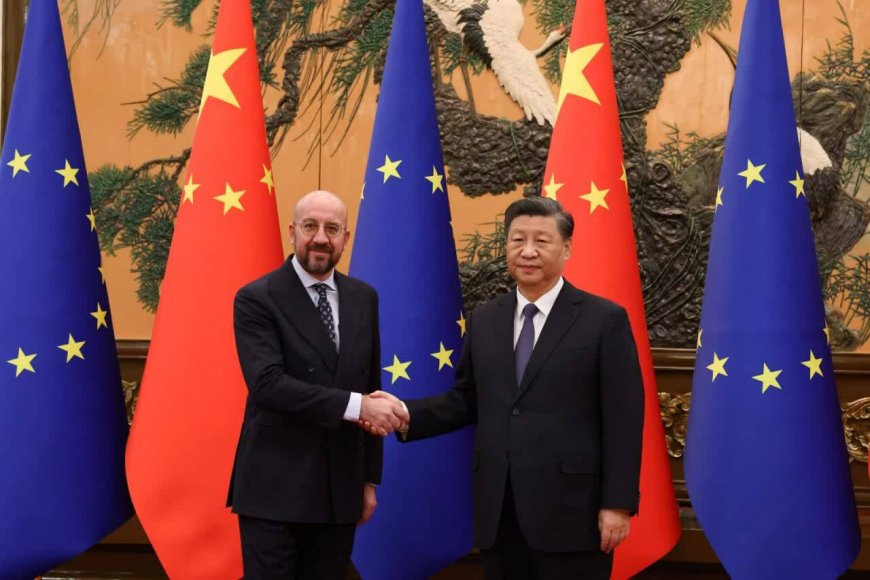From Tensions to Cooperation: Exploring the Future of EU-China Relations
From Tensions to Cooperation: Exploring the Future of EU-China Relations

The relationship between China and Europe has been characterized by a series of fluctuations throughout history, encompassing both constructive and harmonious interactions on important international issues as well as competitive dynamics driven by strategic and long-term goals. Prior to the onset of the COVID-19 pandemic, these relations had deteriorated to a significant extent, with Europe facing China's backlash for raising concerns regarding human rights violations in Xinjiang and Tibet. Consequently, there was a decrease in interactions between the two sides. However, in the aftermath of the pandemic and the conflict in Ukraine, it appears that China and Europe are developing a shared understanding of the future global landscape and are actively seeking to enhance cooperation in economic domains.
This shift is evident in the increased frequency of visits by European officials to China and the formulation of new strategies for collaboration with China, both within the European Union and among independent European countries such as Germany. These actions underscore Europe's recognition of the potential emergence of a multipolar global system and its preparedness for impending challenges. The European Union aspires to augment its role and influence within the international structure, thereby demonstrating its ambitions for strategic independence.
This pursuit of strategic independence encompasses several crucial aspects. Firstly, the European Union seeks to bolster its technological capabilities and reduce dependence on other countries, particularly in key areas such as artificial intelligence and 5G. This drive is fueled by concerns surrounding overreliance on and competition from countries like the United States and China. Secondly, the European Union aims to enhance its economic power on the global stage through the implementation of policies such as digital taxation and increased scrutiny of foreign investments. However, achieving complete independence in this realm is challenging due to the deep integration of the EU market with other major economies.
Additionally, the European Union endeavors to play a more influential role in global governance as an independent geopolitical actor, advocating for its own interests and values. However, the EU's global influence still falls short when compared to other major powers, and member states often harbor divergent opinions on foreign policy matters, making the attainment of unified strategic independence a complex endeavor.
To expand its influence in less privileged countries, the European Union has embraced a global gateway policy, entailing economic investments in infrastructure and the provision of humanitarian aid. Although this approach may potentially clash with China's One Belt, One Road initiative, it can also be aligned with shared interests.
EU-China relations encompass a wide array of areas such as climate, geopolitics, economy, trade, security, technology, agriculture, and transport. Brussels and Beijing are gradually adopting a more competitive rhetoric within these spheres. While cooperation in decarbonization is emphasized, China emphasizes that such cooperation should not be hindered by geopolitical confrontation, and technological dependence should not be weaponized to create tension or exert pressure on others. The European Union acknowledges its dependence on China in certain fields and endeavors to reduce these dependencies. The EU is wary of the potential cultural and social effects of China's influence on Europe and strives to avoid a China-centric discourse that could undermine European values. Nonetheless, Europe does not abandon its pragmatic approach and actively seeks to expand cooperation with China, displaying a considerable degree of flexibility.
Predicting the trajectory of EU-China relations in the coming years is challenging and contingent upon numerous factors. If tensions persist or intensify in areas such as trade, investment, technology, and human rights, the relationship between the European Union and China may become more strained and competitive. Cooperation may be limited in certain domains, while conflict and tension persist in others. The escalation of the US-China conflict could also exert pressure on the EU to align more closely with the United States. Conversely, if EU-US relations deteriorate, the EU may seek greater strategic autonomy and forge closer ties with China, particularly on issues like climate change. The economic development of China's domestic landscape will also influence the relationship, as a struggling or internationally criticized Chinese economy may welcome cooperation with the EU, while a more powerful China may expect the EU to acknowledge its increased influence. Leadership changes on both sides, including the upcoming European Parliament elections in 2024, are likely to impact the economic dynamics of the relationship in the near future. The approach adopted by the new EU leadership team and the next generation of Chinese leadership will determine whether EU-China relations lean towards conflict or cooperation.
In conclusion, EU-China relations are complex and subject to the interplay of geopolitical and economic trends. While tensions and competition may arise, deeper cooperation, particularly on global issues, is also feasible. The trajectory of the relationship hinges upon the unfolding dynamics and the long-term choices made by both parties.













































